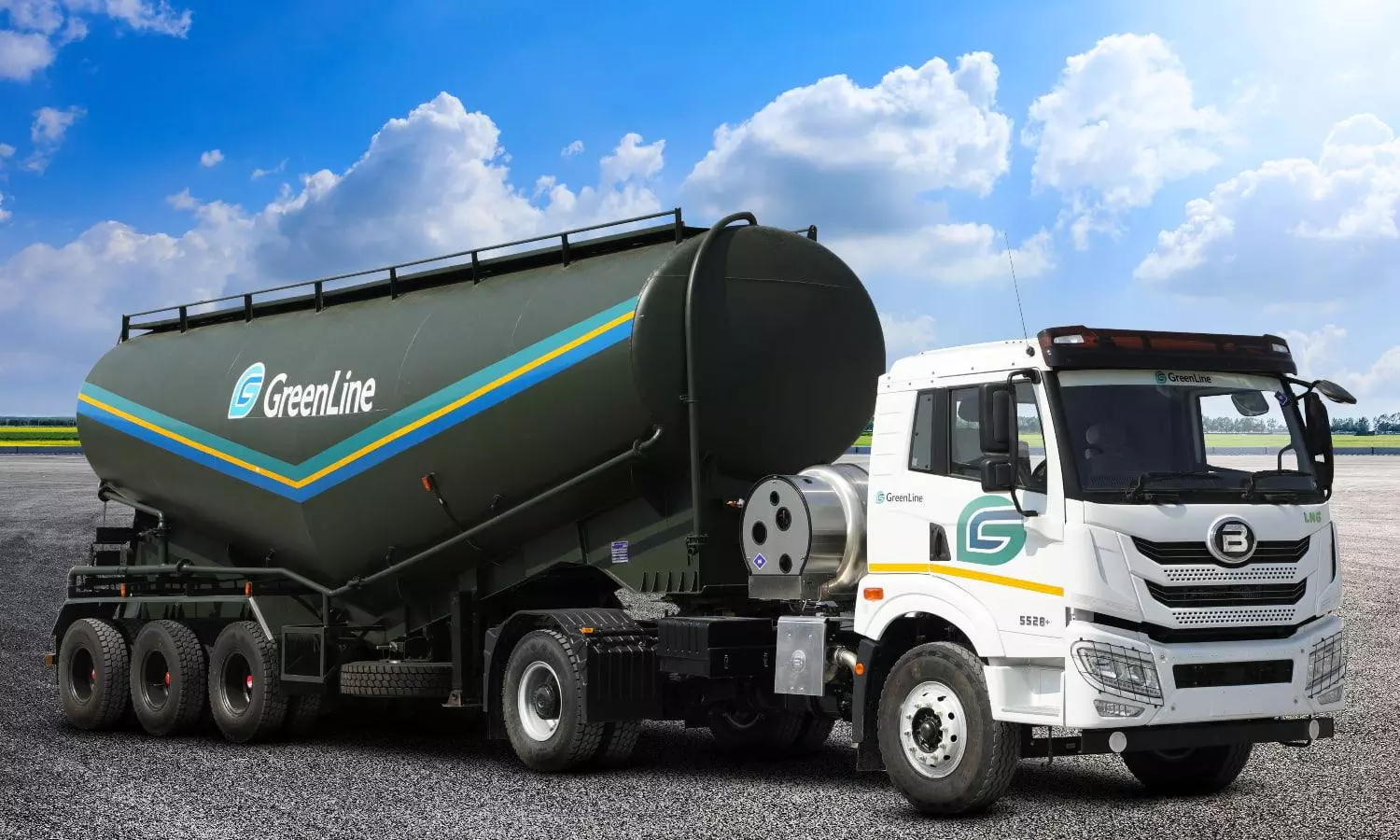Sustainable supply chains: From emissions to efficiency in India

A heavy-duty LNG-powered truck by Greenline
India’s logistics sector is rapidly adopting sustainability measures to cut emissions and enhance efficiency, aligning with the country's pledge to reduce emissions intensity by 45% by 2030.
India's logistics sector stands at a pivotal moment as sustainability transforms from a buzzword into a business imperative. According to data by Blueweave consulting, the India Supply Chain Management (SCM) market was valued at $3.42 billion in 2023 and is expected to grow at a CAGR of 11.1% during the forecast period from 2024 to 2030, reaching an estimated $6.43 billion by the end of 2030. Stakeholders across the spectrum are recognising that environmental responsibility and operational efficiency are not competing priorities but complementary goals.
The green imperative
The transportation and logistics sector accounts for approximately 14% of India's total CO2 emissions, according to recent environmental assessments, as per the data by the United Nations Development Programme, India has pledged to reduce the emissions intensity of its GDP by 45% by 2030. This commitment has brought sustainable supply chain practices to the forefront of industry transformation.
The transition towards sustainable logistics is driven by a complex interplay of environmental necessities and economic opportunities. International trade partners are increasingly demanding green certifications, while domestic consumers show a growing preference for environmentally responsible companies. This shift has compelled logistics companies to reimagine their operational strategies, focusing on reducing carbon footprints through innovative technological interventions.
For instance, Liquefied Natural Gas (LNG) has emerged as a promising alternative fuel technology in the logistics sector. LNG is a cleaner-burning fuel compared to traditional diesel, resulting in significantly lower emissions. Essar Group’s GreenLine Mobility Solutions, a company specialising in sustainable transportation and logistics in India, is the first in the country to operate a fleet of LNG-powered heavy-duty trucks. Hindustan Zinc, India’s largest producer of zinc, lead, and silver, recently partnered with GreenLine to integrate its LNG-powered fleet into the company’s supply chain and transportation operations.
According to GreenLine, its LNG-powered trucks, manufactured by Blue Energy Motors, offer significant reductions in emissions compared to diesel: up to 30% in CO2, 100% in SOx, 59% in NOx, 91% in particulate matter, and 70% in CO.
“By reducing emissions and enhancing energy security, we’re setting new standards for reliable, eco-conscious logistics—building a resilient foundation for the future.”
Anand Mimani, GreenLine Mobility Solutions
Compressed Natural Gas (CNG) has also found widespread adoption in urban and regional logistics networks. Companies such as SafeExpress and Delhivery have strategically adopted CNG vehicles, focusing on high-pollution metropolitan areas like Delhi-NCR, Mumbai, and Bangalore. In June this year, Delhivery introduced 20 Volvo LNG-powered tractor-trailers into its fleet.
These vehicles help lower particulate matter emissions while offering a cost-effective alternative, with CNG priced at nearly half the cost of petrol and diesel.
Additionally, Biofuels have also emerged as a promising alternative to traditional fossil fuels in the Indian logistics sector, offering a significant pathway to reduce carbon emissions and enhance sustainability. These renewable energy sources, derived from organic materials such as agricultural waste, plant oils, and biomass, are increasingly being explored as a viable solution to the transportation sector's environmental challenges.
Recently, Amazon India and Hindustan Petroleum Corporation Limited (HPCL) formed a strategic partnership to accelerate the development and adoption of low-carbon fuels (LCFs) for long-haul transportation in India. The two companies will conduct a pilot to test the use of sustainable fuels in Amazon’s long-haul transport vehicles, exploring the potential of fuelling hubs and mobile refueling stations for easy access to LCFs.
“Biofuels are key to India’s energy transition and are set to contribute to jobs and economic growth. Amazon’s collaboration with HPCL is a step toward empowering this transformational shift, and we are glad to be a part of this journey,” states Abhinav Singh, VP-Operations, Amazon India.
Driving sustainability with electric vehicles
Electric vehicles (EVs) integration represents the most transformative approach to sustainable logistics. According to a report by Wright Research, the EV Industry in India has witnessed remarkable growth, with projections indicating that the market is set to expand from $23.38 billion in 2024 to an impressive $117.78 billion by 2032. The Indian government is also supporting the growth of the EV industry with initiatives like the FAME II scheme and the Electric Mobility Promotion Scheme (EMPS-2024). A key advantage of EVs is their substantially reduced carbon footprint compared to conventional fuel-powered vehicles.
Lower operational costs are also a key driver behind the adoption of EVs in logistics. EVs typically incur lower maintenance expenses and are more energy-efficient, delivering long-term savings for fleet operators. Advances in battery technology have further enhanced EVs with extended ranges and faster charging times, mitigating concerns about vehicle downtime.
Blue Dart, South Asia's leading courier and integrated express package distribution company, recently expanded its EV fleet to over 480 EVs, including 2-, 3-, and 4-wheelers. The company estimates that integrating EVs into its fleet will reduce approximately 15.05 tonnes of CO2 emissions per month.
NITI Aayog estimates that adopting EVs could help India cut logistics costs by 4% of its GDP by 2030.
However, while challenges such as limited charging infrastructure and high upfront investment costs persist for EVs in India, their long-term benefits are becoming increasingly compelling.
“To reduce energy consumption and support our sustainable logistics model, we are integrating electric and CNG vehicles into our fleet.”
Vishwachetan Nadamani, Ecom Express
“In a fast-changing world, GreenLine Mobility Solutions is committed to a sustainable supply chain powered by LNG and EV technologies. By reducing emissions and enhancing energy security, we’re setting new standards for reliable, eco-conscious logistics — building a resilient foundation for the future,” said Anand Mimani, CEO, GreenLine Mobility Solutions.
Vishwachetan Nadamani, Chief Operating Officer of Ecom Express, a leading provider of technology-enabled logistics solutions for India's retail and e-commerce industry says, “To reduce energy consumption and support our sustainable logistics model, we are also integrating electric and CNG vehicles into our fleet. As of March 2024, we have 175 EVs and CNG vehicles, which helps us reduce our carbon footprint and save on fuel and maintenance costs. This change plays a big part in our goal to create a greener and more sustainable supply chain.”
Packaging innovation
The focus on sustainable packaging has intensified as e-commerce volumes surge. Companies are increasingly adopting biodegradable materials and implementing reverse logistics for packaging recovery. From the e-commerce perspective Nadamani of Ecom Express, says, “We're working on eco-friendly packaging to cut down on waste. We focus on materials that can be recycled for plastic seals, canvas bags, and flyers. Plus, we are also working on innovative designs to reduce their size. These steps help us meet the growing demand from customers for green practices while making our logistics network more sustainable overall.”
According to Amazon India, replacing thin-film single-use plastic packaging with paper and cardboard-based materials across its India fulfilment network has helped the company avoid 5,300 metric tonnes of plastic packaging over the past three years. Amazon’s fulfilment centres in India now ship to customers with reduced or no additional packaging.
Building on the momentum of sustainable practices, integrated packaging solutions are also gaining traction across industries. These solutions streamline the packaging process by combining multiple functionalities, such as enhanced product protection, efficient space utilisation, and branding opportunities, into a single package design. A recent blog by TVS Supply Chain Solutions cites a report from the Federation of Indian Chambers of Commerce and Industry (FICCI), highlighting that the Indian packaging industry is projected to reach $205 billion by 2025.
The blog notes that key industries, including fast-moving consumer goods (FMCG), manufacturing, engineering, procurement, and construction (EPC), and pharmaceuticals, are progressively adopting integrated packaging solutions.
The integration of technology into packaging is a major game-changer. Smart packaging solutions, like QR codes and NFC technology, enable brands to connect with consumers, offer product information, and enhance the overall customer experience, it mentions.
Warehouse sustainability
Modern warehousing in India is undergoing its green revolution. Solar panels now power multiple fulfilment centres across the country. Advanced warehousing solutions now integrate Internet of Things (IoT) sensors and artificial intelligence to optimise space utilisation, reduce waste, and minimise environmental impact. Companies are implementing rainwater harvesting systems, green building materials, and natural ventilation techniques to create eco-friendly logistics spaces. Intelligent climate control systems use predictive algorithms to manage temperature and humidity, reducing energy consumption while maintaining optimal storage conditions for various goods. Waste management has also become a critical focus, with modern warehouses implementing comprehensive recycling programmes, converting organic waste into compost, and developing closed-loop systems that minimise the overall environmental footprint.
Challenges and future outlook
Despite progress, challenges remain. The high initial cost of sustainable technologies, the fragmented nature of the Indian logistics sector, and infrastructure gaps continue to pose challenges. “One of the key challenges we face at Ecom Express is the infrastructure limitations, especially regarding the availability and accessibility of recyclable materials for packaging. While we have made significant strides with green packaging, switching to eco-friendly alternatives for plastic seals, canvas bags, and flyers, the initial cost of sourcing these materials can be high. Similarly, integrating electric and CNG vehicles into our fleet involves managing maintenance and performance across India’s varied climate,” says Nadamani of Ecom Express.
Ecom Express's electric 3-wheeler shipment delivery vehicle
The path ahead is clear – sustainability in supply chains is not only an environmental necessity but also a key competitive advantage. Government initiatives, such as the Production Linked Incentive (PLI) scheme for electric vehicles and renewable energy, are driving the transition forward. Additionally, the digital transformation in Indian logistics is playing a crucial role in advancing sustainability efforts. Advanced route optimisation algorithms are enabling companies to cut fuel consumption by up to 20%, while IoT sensors and real-time tracking systems are minimising waste through improved inventory management.
Economic benefits of going green
The business case for sustainable supply chains is becoming increasingly clear. According to Wipro, companies can reduce costs by 20-30% by transitioning to a sustainable supply chain. Additionally, sustainable practices are opening doors to international markets where environmental credentials are prerequisites for business partnerships. The potential for creating new revenue streams through innovative sustainable solutions, coupled with government incentives and tax benefits for green investments, makes sustainability a strategic economic opportunity. Sustainable supply chains can create opportunities for new partnerships.
The Indian government's National Logistics Policy, launched in 2022, has created frameworks for public-private partnerships in developing green logistics infrastructure.
The journey toward sustainable supply chains in India is gathering momentum, driven by a combination of environmental necessity, economic opportunity, and technological innovation. For India's logistics sector, the path forward is clear – sustainability is not just about being green, it's about being future-ready.

Parijat Sourabh
As a news correspondent at STAT Publishing Group, I cover stories on logistics, aviation, and air cargo. Feel free to contact me at parijat@statpublishinggroup.com


